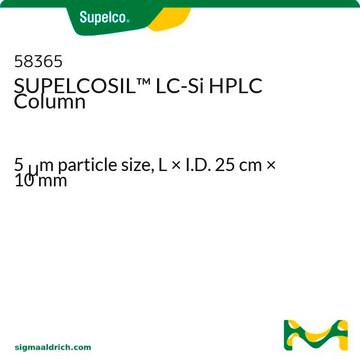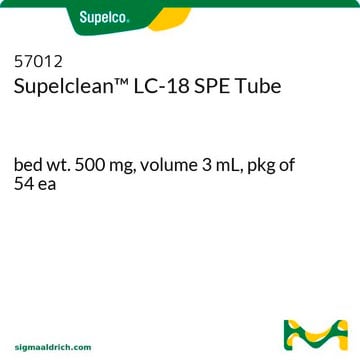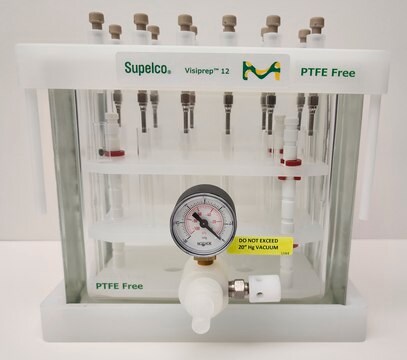58229
SUPELCOSIL™ LC-PAH (5 µm) HPLC Columns

L × I.D. 25 cm × 4.6 mm, HPLC Column
Sign Into View Organizational & Contract Pricing
All Photos(1)
About This Item
UNSPSC Code:
41115700
eCl@ss:
32110501
Recommended Products
Product Name
SUPELCOSIL™ LC-PAH HPLC Column, 5 μm particle size, L × I.D. 25 cm × 4.6 mm
Agency
suitable for USP L1
manufacturer/tradename
SUPELCOSIL™
parameter
0-70 °C temperature
400 bar pressure (5801 psi)
technique(s)
HPLC: suitable
L × I.D.
25 cm × 4.6 mm
matrix
silica gel, spherical particle platform
matrix active group
C18 (octadecyl) phase
particle size
5 μm
pore size
120 Å
application(s)
food and beverages
separation technique
reversed phase
Looking for similar products? Visit Product Comparison Guide
General description
SUPELCOSIL LC-PAH columns were designed specifically for analyses of the priority pollutant PAHs listed in US EPA Method 610. 2.1 mm and 3.0 mm columns save solvent and improve sensitivity when sample mass is limited. 3 μm columns provide extremely rapid, highly efficient analyses, while retaining the durability of porous silicas. They are excellent and economical substitutes for 1.5 μm nonporous silicas.
Legal Information
SUPELCOSIL is a trademark of Sigma-Aldrich Co. LLC
guard cartridge
Product No.
Description
Pricing
related product
Storage Class Code
13 - Non Combustible Solids
WGK
WGK 3
Flash Point(F)
Not applicable
Flash Point(C)
Not applicable
Choose from one of the most recent versions:
Already Own This Product?
Find documentation for the products that you have recently purchased in the Document Library.
Customers Also Viewed
S Moret et al.
Zeitschrift fur Lebensmittel-Untersuchung und -Forschung, 201(4), 322-326 (1995-10-01)
This paper proposes a simple HPLC method for the determination of polycyclic aromatic hydrocarbons (PAHs) in water, wine and beer. Samples were purified by PAH collection in solid-phase extraction (SPE) and analysed by reversed-phase HPLC (Supelcosil LC-PAH column from Supelco).
Ana Ballesteros-Gómez et al.
Analytical chemistry, 81(21), 9012-9020 (2009-09-30)
In this work, magnetic nanoparticles (MNPs) coated with hemimicelles of alkyl (C(10)-C(18)) carboxylates, which have traditionally been used to prepare ferrofluids for technological applications, were used for the first time to extract organic contaminants from environmental water samples. The nanoparticles
Our team of scientists has experience in all areas of research including Life Science, Material Science, Chemical Synthesis, Chromatography, Analytical and many others.
Contact Technical Service




